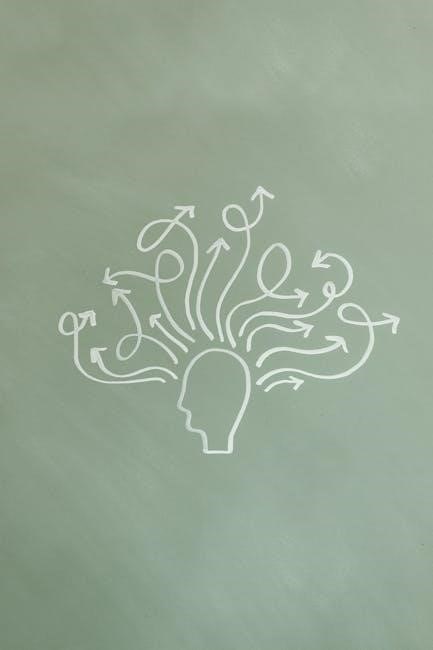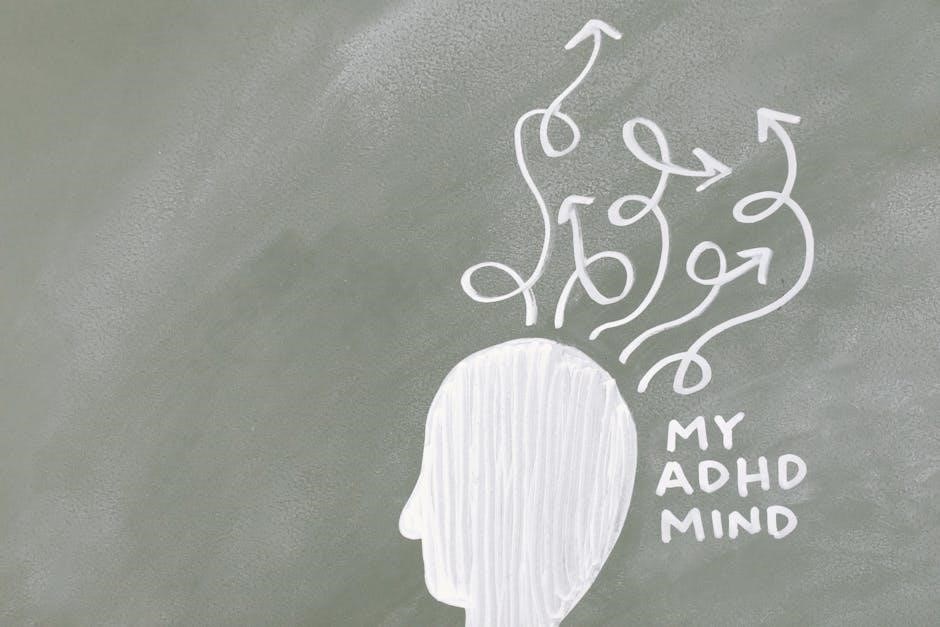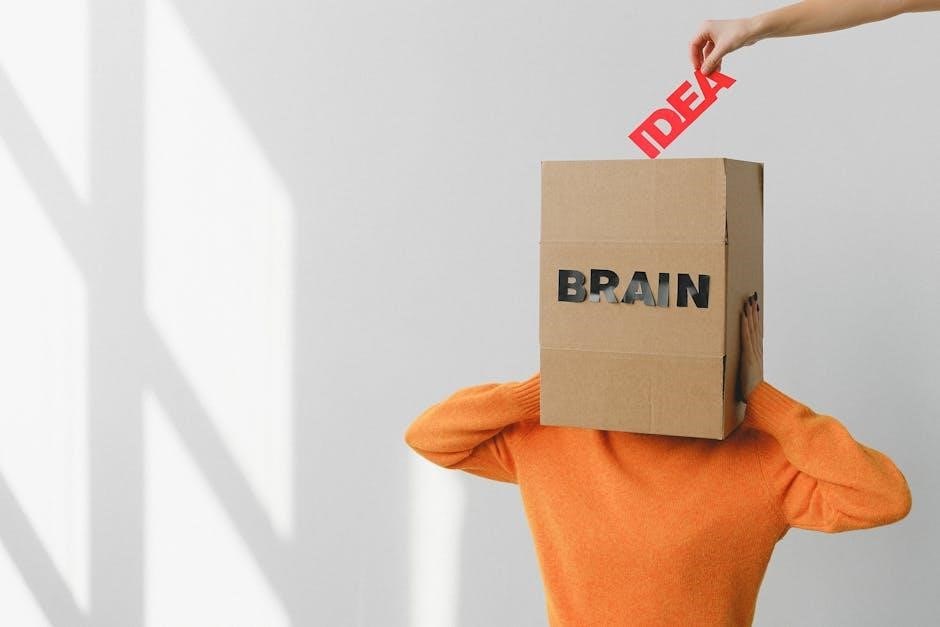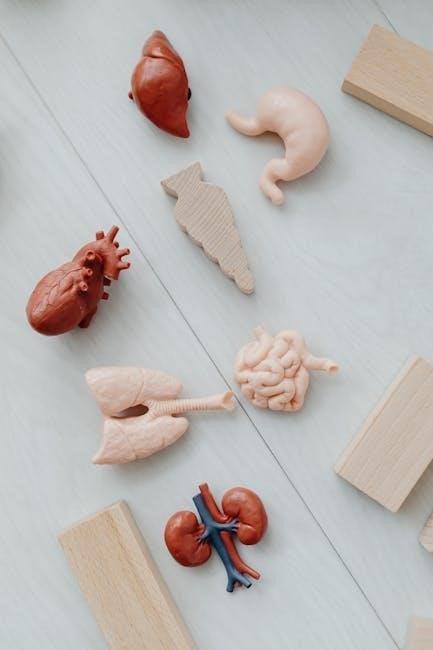Addiction is a brain disease affecting reward‚ motivation‚ and memory. Substance use triggers dopamine release‚ leading to compulsive behaviors. Brain changes result in loss of control‚ defining addiction’s cycle.
1.1 Understanding Addiction as a Brain Disease
Addiction is recognized as a chronic brain disease affecting reward‚ motivation‚ and memory systems. It alters brain structure and function‚ particularly dopamine release‚ leading to compulsive behaviors. Prolonged substance use depletes dopamine‚ causing the brain to rely on the drug to feel pleasure. This biological transformation traps individuals in a cycle of craving and consumption‚ making addiction a medical condition rather than a moral failing. Worksheets like “Addiction and the Brain” help educate individuals about these changes‚ fostering understanding and treatment.
1.2 The Role of Dopamine in Addiction
Dopamine plays a central role in addiction‚ acting as a neurotransmitter associated with pleasure and reward. Substance use triggers excessive dopamine release‚ reinforcing behaviors. Over time‚ the brain adapts by reducing dopamine production‚ leading to tolerance and withdrawal symptoms when the substance isn’t present. This depletion forces individuals to consume more to restore dopamine levels‚ perpetuating the addiction cycle. Worksheets like “Addiction and the Brain” highlight how dopamine dysfunction drives dependency‚ aiding in understanding the biological basis of addiction and the need for targeted treatments to restore normal brain function and break the cycle.

How the Brain Changes with Addiction
Addiction alters brain structure and function‚ particularly in reward pathways. Chronic drug use depletes dopamine‚ leading to tolerance‚ withdrawal‚ and long-term neurological changes that sustain dependency.
2.1 Dopamine Depletion and Its Impact
Dopamine depletion occurs when repeated substance use exhausts the brain’s dopamine supply. This leads to tolerance‚ as more drugs are needed to achieve the same high. Over time‚ the brain relies on the substance to regulate dopamine‚ causing withdrawal symptoms when it’s absent. This biological adaptation disrupts normal reward pathways‚ making it harder to experience pleasure without the drug. Dopamine depletion significantly impacts motivation and decision-making‚ deepening the cycle of addiction and reducing the individual’s ability to control substance use.

2.2 Tolerance and Withdrawal Mechanisms
Tolerance occurs as the brain adapts to substance use‚ requiring more drugs to achieve the same effect. This adaptation involves changes in dopamine receptors and neurotransmitter systems. Withdrawal happens when the substance is withheld‚ causing the brain to struggle without its artificial dopamine supply. Symptoms arise as the brain tries to regain balance‚ often leading to physical and psychological distress. These mechanisms trap individuals in a cycle of escalating use and dependency‚ making cessation increasingly difficult and highlighting the biological grip of addiction on the brain.
The Role of Mental Health in Addiction
Mental health disorders often co-occur with addiction‚ influencing its development and recovery. Conditions like anxiety or depression can exacerbate substance use‚ creating a complex cycle.
3.1 Co-Occurring Disorders and Addiction
Co-occurring disorders‚ where mental health conditions and addiction exist together‚ are common. Issues like depression‚ anxiety‚ or trauma often precede addiction‚ while substance abuse can worsen these conditions. This dual struggle creates a complex cycle‚ as mental health challenges may drive drug use‚ and addiction can exacerbate symptoms. Understanding these connections is crucial for effective treatment‚ as addressing one without the other often leads to relapse. Integrated care that targets both mental health and addiction simultaneously is essential for lasting recovery and overall well-being;
3.2 How Mental Health Affects Recovery
Mental health significantly influences addiction recovery. Untreated conditions like depression or anxiety can hinder progress‚ leading to relapse. Conversely‚ addressing mental health improves coping mechanisms and reduces cravings. Cognitive-behavioral therapies often target both issues‚ fostering resilience. A stable mental state enhances participation in treatment‚ promoting long-term sobriety and emotional well-being. Neglecting mental health can derail recovery‚ emphasizing the need for comprehensive care that integrates psychological support with addiction treatment strategies.

Treatment Strategies for Addiction
Treatment strategies for addiction often combine behavioral therapies and medications. These approaches target the brain’s dopamine system‚ helping patients manage cravings and achieve long-term recovery.
4.1 Behavioral Therapies and Their Effectiveness
Behavioral therapies play a crucial role in addiction treatment by addressing the psychological aspects of substance use. Techniques like cognitive-behavioral therapy (CBT) help individuals identify triggers and develop coping strategies. Contingency management and motivational interviewing are also effective‚ encouraging positive behaviors and increasing motivation to change. These therapies aim to modify thought patterns and behaviors‚ reducing the risk of relapse. By targeting the brain’s reward system‚ they help restore healthy neural pathways‚ promoting long-term recovery and improved mental health outcomes.
4.2 Medications That Target the Brain
Medications targeting the brain are essential in managing addiction by reducing cravings and withdrawal symptoms. Drugs like methadone and buprenorphine block opioid receptors‚ while naltrexone prevents relapse. For stimulant addictions‚ medications such as methylphenidate can help regulate dopamine levels. Antidepressants and mood stabilizers are often used to address co-occurring mental health disorders. These medications restore brain chemistry balance‚ allowing individuals to focus on recovery. By stabilizing neural functions‚ they support long-term sobriety and improve overall brain health‚ making them a critical component of comprehensive addiction treatment plans.
Worksheets and Educational Resources
Addiction and the brain worksheet PDFs provide educational tools to understand the neurobiology of addiction. Free resources like “Addiction and the Brain Worksheet” and “Drugs And The Brain Worksheet” offer practical exercises and insights‚ aiding recovery and awareness.
5.1 The Importance of Worksheets in Understanding Addiction
Worksheets are essential tools for educating individuals about addiction’s impact on the brain. Resources like “Addiction and the Brain Worksheet” and “Drugs And The Brain Worksheet” provide interactive exercises to enhance understanding. These materials help users visualize how substances alter brain chemistry‚ particularly dopamine levels‚ leading to dependency. By engaging with these worksheets‚ individuals can better grasp the biological and psychological aspects of addiction. They also serve as valuable aids in recovery‚ offering practical insights and strategies for managing cravings and rebuilding cognitive health. These educational resources are widely available in PDF formats‚ making them accessible for personal or group use.
5.2 Recommended PDF Resources for Further Learning
For deeper understanding‚ recommended PDF resources include “Addiction and the Brain Worksheet” and “Drugs And The Brain Worksheet.” These materials offer interactive exercises and scientific insights into how substances affect brain chemistry. The National Institute on Drug Abuse provides free PDF guides‚ while “SUBI Client Workbook” includes handouts for group sessions. These resources are ideal for educators‚ healthcare providers‚ and individuals seeking to comprehend addiction’s neurological aspects. They are easily accessible online‚ supporting both personal and professional learning journeys in addiction recovery and brain health.

Neuroplasticity and Recovery
Neuroplasticity allows the brain to heal and adapt over time. Recovery restores dopamine levels and neural pathways‚ helping individuals overcome addiction and regain cognitive function.
6.1 How the Brain Heals Over Time
The brain’s healing process involves neuroplasticity‚ where neural pathways adapt and recover. Over time‚ dopamine levels stabilize‚ reducing cravings. With abstinence‚ damaged brain cells regenerate‚ improving cognitive function and emotional regulation. This recovery supports long-term sobriety and mental health. Worksheets and educational resources guide individuals through understanding these biological changes‚ aiding in sustained recovery efforts. The brain’s ability to heal underscores the importance of consistent treatment and support in overcoming addiction.
6.2 The Role of Neuroplasticity in Long-Term Recovery
Neuroplasticity plays a crucial role in long-term recovery by rewiring the brain’s circuits. Through repeated healthy behaviors‚ new neural pathways form‚ replacing addiction-related habits. This process strengthens self-control and reduces relapse risk. Worksheets and educational resources highlight how neuroplasticity aids recovery‚ encouraging individuals to engage in practices that promote brain adaptability. Over time‚ the brain adapts‚ leading to sustained sobriety and improved mental health. Neuroplasticity’s potential underscores the importance of consistent‚ targeted efforts in overcoming addiction and achieving lasting change. This biological adaptability offers hope for a full recovery.
Addiction‚ as a brain disease‚ reshapes reward systems‚ driven by dopamine. Substance abuse depletes dopamine‚ fostering dependence. Recovery relies on neuroplasticity‚ offering hope for lasting change and healing;
7.1 Summary of Key Concepts
Addiction is fundamentally a brain disease‚ altering reward‚ motivation‚ and memory systems. Dopamine plays a central role in addiction‚ as substances hijack and deplete this neurotransmitter. Tolerance and withdrawal emerge due to brain changes‚ while co-occurring mental health disorders complicate recovery. Treatment strategies‚ including behavioral therapies and medications‚ target these brain mechanisms. Worksheets and educational resources‚ like PDF guides‚ aid understanding and recovery. Neuroplasticity offers hope for long-term healing‚ emphasizing the brain’s ability to adapt and recover over time.
7.2 The Future of Addiction Treatment and Research
Future addiction treatment may focus on personalized medicine‚ leveraging genetic and brain data for tailored interventions. Advances in neuroplasticity research could enhance recovery strategies‚ while improved medications might target dopamine systems more effectively. Behavioral therapies could incorporate virtual reality and digital tools for better engagement. Educational resources‚ like PDF worksheets‚ will continue to play a role in awareness and relapse prevention. Collaborative efforts between researchers and clinicians are essential to developing innovative solutions and improving outcomes for those affected by addiction.
